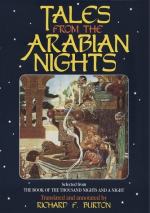A splendid and glorious life was that of Baghdad in the days of the mighty Caliph,[FN#310] when the Capital had towered to the zenith of grandeur and was already trembling and tottering to the fall. The centre of human civilisation, which was then confined to Greece and Arabia, and the metropolis of an Empire exceeding in extent the widest limits of Rome, it was essentially a city of pleasure, a Paris of the ixth century. The “Palace of Peace” (Dar al-Salam), worthy successor of Babylon and Nineveh, which had outrivalled Damascus, the “Smile of the Prophet,” and Kufah, the successor of Hira and the magnificent creation of Caliph Omar, possessed unrivalled advantages of site and climate. The Tigris-Euphrates Valley, where the fabled Garden of Eden has been placed, in early ages succeeded the Nile- Valley as a great centre of human development; and the prerogative of a central and commanding position still promises it, even in the present state of decay and desolation under the unspeakable Turk, a magnificent future,[FN#311] when railways and canals shall connect it with Europe. The city of palaces and government offices, hotels and pavilions, mosques and colleges, kiosks and squares, bazars and markets, pleasure grounds and orchards, adorned with all the graceful charms which Saracenic architecture had borrowed from the Byzantines, lay couched upon the banks of the Dijlah-Hiddekel under a sky of marvellous purity and in a climate which makes mere life a “Kayf”—the luxury of tranquil enjoyment. It was surrounded by far extending suburbs, like Rusafah on the Eastern side and villages like Baturanjah, dear to the votaries of pleasure; and with the roar of a gigantic capital mingled the hum of prayer, the trilling of birds, the thrilling of harp and lute, the shrilling of pipes, the witching strains of the professional Almah, and the minstrel’s lay.
The population of Baghdad must have been enormous when the smallest number of her sons who fell victims to Hulaku Khan in 1258 was estimated at eight hundred thousand, while other authorities more than double the terrible “butcher’s bill.” Her policy and polity were unique. A well regulated routine of tribute and taxation, personally inspected by the Caliph; a network of waterways, canaux d’arrosage; a noble system of highways, provided with viaducts, bridges and caravanserais, and a postal service of mounted couriers enabled it to collect as in a reservoir the wealth of the outer world. The facilities for education were upon the most extended scale; large sums, from private as well as public sources, were allotted to Mosques, each of which, by the admirable rule of Al-Islam, was expected to contain a school: these establishments were richly endowed and stocked with professors collected from every land between Khorasan and Marocco;[FN#312] and immense libraries[FN#313] attracted the learned of all nations. It was a golden age for poets and panegyrists, koranists and literati, preachers and rhetoricians, physicians and




